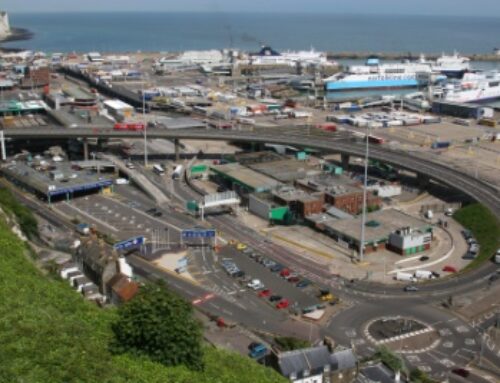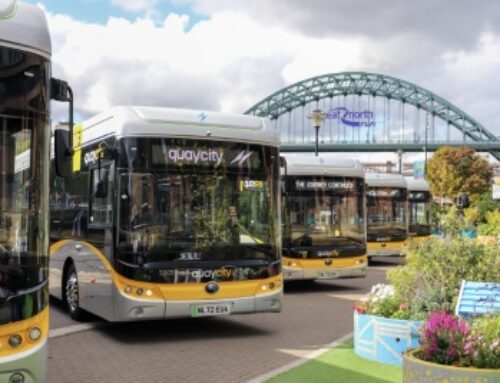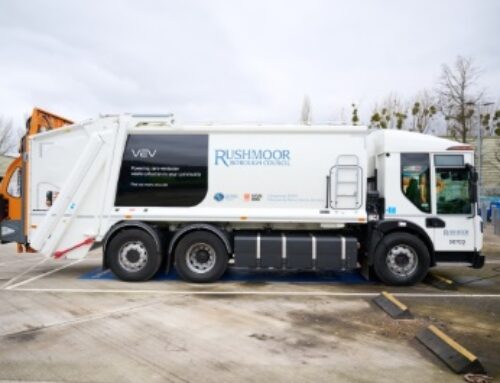Disquiet over new mayor’s transport plans
 The election of Labour’s Sadiq Khan as London mayor is already ruffling feathers within the road transport industry, if reaction to some of his policy announcements from sector representatives is any indication.
The election of Labour’s Sadiq Khan as London mayor is already ruffling feathers within the road transport industry, if reaction to some of his policy announcements from sector representatives is any indication.
Mr Khan’s election manifesto included a pledge to: “reduce the number of large lorries on the city’s roads, particularly at the busiest times” – as well as a promise to “promote safer, cleaner lorries,” work on which, early annouCncements confirm, is already underway.
Transport for London’s (TfL) freight and fleet communications and engagement manager Tim Ward told the Microlise Transport Conference in Coventry last month that 90 per cent of all freight in London (worth an estimated £200 billion a year) was currently carried on the road. Traffic congestion was estimated to cost £26 billion a year.
And the situation was likely to only get worse because: “in the next 14 years, the population of London will grow by the equivalent of the populations of Birmingham and Leeds.”
To stem pollution, Mr Khan is already consulting on plans to introduce an additional central London traffic charge next year for the most polluting vehicles entering the city; proposals to bring forward the ultra-low emission zone (ULEZ) compliance date so that all diesel vans and trucks entering inner London (crossing the North or South Circular Roads) will need to meet their respective Euro 6 standards, possibly as early as 2018; and a requirement for all trucks entering Greater London to be Euro 6 by 2020.
He also announced proposals for TfL to ‘lead by example’ by purchasing only hybrid or zero-emission double-decker buses from 2018; introducing self-imposed ULEZ standards a year earlier than the rest of the scheme for the double-decker bus fleet; expanding the ULEZ retrofit programme to 3,000 buses outside the central zone; and implementing ‘clean bus corridors’ on the dirtiest routes.
Responding to questions asked at the Microlise Conference, Mr Ward told delegates that it was not in TfL’s gift to ease restrictions on night-time truck movements to compensate for potential lost delivery opportunities in the day, because the Lorry Control Scheme was administered by the London boroughs.
He suggested that continuous improvements in vehicle design meant that the scheme might now be considered unnecessary.
“It was put in place 30 years ago and has not been reviewed since,” he pointed out.
The Road Haulage Association said it was keen to work with the new mayor to address congestion pollution and road safety, and it had invited Mr Khan to spend a day in the cab of a truck in London, so he could see the situation for himself.
Addressing calls from various quarters for a rush-hour truck ban, chief executive Richard Burnett said: “This is not the answer. Such a move would simply increase the number of vehicles, particularly vans, using the roads at a time when London residents expect to have their ‘day’ delivered.
“Restaurants and other retail outlets would suffer and the delays to construction projects, already working within strict time constraints, would be inevitable.”
The British Vehicle Rental & Leasing Association chief executive Gerry Keaney commented: “Last minute adjustments to the ULEZ scheme would not give businesses time to prepare and could punish a large number of companies who have already planned their vehicle requirements based on the scheduled 2020 introduction date.
“It took years of planning, research and consultation to come up with the current ULEZ proposals and rushing through with any changes could have major unforeseen repercussions.”
The Freight Transport Association (FTA) said Mr Khan’s air quality plans would add substantial cost for transport operators and businesses, and could put some small firms out of work altogether.
In a letter to Mr Khan, the FTA’s chief executive, David Wells, added: “I must be honest and say that, given calls for simplistic HGV bans, the way policy may develop in London concerns our 15,000 member businesses more than almost any other issue in the UK.”
Welcoming the new mayor to his role, FTA’s head of national and regional policy Christopher Snelling said: “Mr Khan must remember how crucial logistics is to London.
“The capital requires 360,000 tonnes of goods delivered every day by lorry just to keep functioning. And Mr Khan’s ambition to build 80,000 new homes a year will need more than two million HGV trips to make it happen.”
He highlighted a review of the London Lorry Control Scheme; a congestion charge discount for the latest-generation clean lorries and vans; and increased support for targeted enforcement of rogue operators, as key policy areas which: “we think the new mayor should pursue immediately.”
Jacqueline O’Donovan, managing director of Tottenham-based O’Donovan Waste Disposal, said she was disappointed to hear of plans to bring the ULEZ forward, since it would leave “operators with very little time to plan for the reforms”.
She continued: “[Mr Khan’s] clean air revolution will require HGV operators to reduce diesel emissions in all forms across their entire fleets, as well as require them to adopt new clean technologies.
“At O’Donovan our operations fully support our overall objective to dramatically improve sustainability, by reducing the carbon impact of construction waste logistics.
“We have already made significant reductions to idling and reduced carbon impact, and our fleet management system has seen a 50 per cent drop in vehicle idling over a five-year period – thereby reducing the company’s carbon footprint by 21.5 per cent. But this does not happen overnight and the wider industry needs time to make further changes and adopt new technologies.”
Ashley Sowerby, managing director at fleet management software specialist Chevin, said fleets across the country should look carefully at Mr Khan’s proposals, as they could form a blueprint for how vehicles are targeted in other major cities in the UK.
“If adopted, they will create pressure on other cities to make similar moves, which is something that will affect more and more fleets over the next few years.
“A key point to note is that the new suggestions are envisaged as happening much more quickly than previous ideas for London. The additional congestion charge could happen in 2017 and the extended emissions zone by 2019.”
Mr Sowerby pointed to the recent naming of the UK’s first four Go Ultra Low cities – Nottingham, Bristol, Milton Keynes and London – as evidence of a general trend towards central and local government working to improve air quality.
“This is something that fleets across the country will undoubtedly be encountering more and more. We could soon reach a point where they have to address the issue operationally.”
Meanwhile, road safety charity Brake welcomed Mr Khan’s pledge to support further rollouts of 20mph zones across the capital.
Gary Rae, director of com-munications and campaigns, said: “Mr Khan’s backing clearly shows that he recognises that 20mph limits can enable people to get around their neighbourhoods, towns and city centres more safely, whilst promoting a healthy and sustainable environment.”
The new London mayor’s attitude to road transport was a hot topic at a round table event at the Microlise Transport Conference, which saw representatives of the seven major truck manufacturers active in the UK take questions from the floor.
Ray Ashworth, managing director of DAF, said: “We could end up with politicians designing trucks. There’s a danger of local mayors having specific design requirements for trucks operating in ‘their’ cities.
“Maybe the train has left the station, but we need at very least a common standard: we know that TfL has a view of what’s required.”
Nigel Butler, commercial director of Renault Trucks UK, said: “There’s a danger of Manchester and Birmingham each wanting something different from each other, and perhaps different again from London.”
Volvo’s product manager John Comer warned: “Truck design is a slow business…a long-haul cab design will last 21 years,” while MAN’s managing director Simon Elliott opined: “We will have to do what local government wants, whether that be on fuel and exhaust emissions or adding extra mirrors.”











